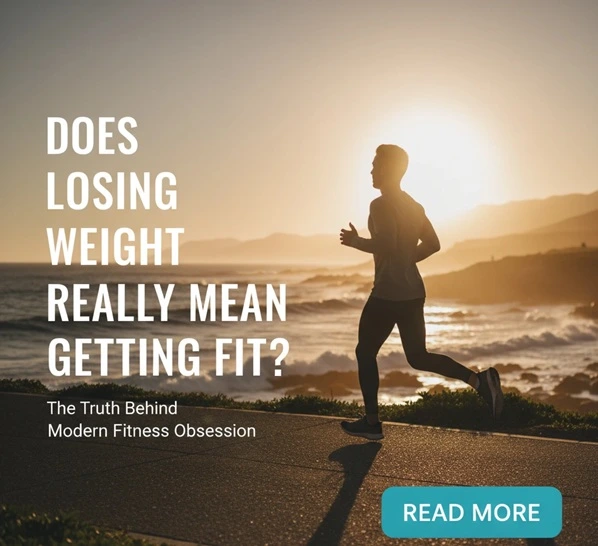The Modern Obsession with Weight Loss
In today’s world, where social media filters and fitness influencers dominate our screens, the idea of “being fit” often gets confused with “being thin.”
Everywhere you look — from celebrity transformations to diet trends — people seem to chase one goal to lose weight. But amid this rush to fit into smaller jeans or flaunt a slimmer selfie, an important question gets lost, Does losing weight really mean you’re fit?
The truth is, weight loss and fitness are not the same thing. They may overlap in certain cases, but one does not guarantee the other. Fitness is about how your body performs, feels and sustains itself in the long run. Weight loss, on the other hand, is merely a number on a scale — and that number can be very misleading.

Weight Loss vs. Fitness: Understanding the Difference
Weight loss is a reduction in your overall body weight. This can happen due to fat loss, muscle loss or even water loss. Many people mistake dropping weight as progress, but the real question should be what kind of weight are you losing?
Fitness, however, is a much broader term. It includes strength, stamina, flexibility, endurance and mental well-being. A person might weigh more but still be fitter than someone who appears slimmer.
For example, athletes or bodybuilders often have higher body weights due to muscle mass, yet they’re among the fittest individuals. Conversely, someone who drastically cuts calories might look lean but struggle with energy, strength or immunity — indicating poor fitness.
Why People Equate Thinness with Fitness
This confusion isn’t accidental. It’s driven by years of cultural conditioning. Society often glorifies the “ideal body type,” especially for women, pushing unrealistic standards of beauty.
Brands, movies and social media reinforce the idea that being thin is attractive — and therefore, automatically healthy. This creates pressure to achieve visible results rather than focusing on actual health.
The result? People start dieting, skipping meals or overexercising just to see the number on the scale go down, without understanding what it’s doing to their body from the inside.
The Hidden Side Effects of Losing Weight the Wrong Way
Losing weight isn’t bad — in fact, when done correctly, it can improve health, reduce the risk of lifestyle diseases and boost confidence. But when done without knowledge or guidance, it can do more harm than good.
Here are some of the common side effects and dangers of rapid or unplanned weight loss:
1. Muscle Loss Instead of Fat Loss
Crash diets often lead your body to burn muscle for energy instead of fat. This weakens your body, slows metabolism and makes it harder to maintain your weight later.
2. Nutrient Deficiencies
Skipping meals or following fad diets can deprive your body of essential nutrients like iron, calcium, and protein. This can lead to fatigue, hair loss, brittle nails, and even hormonal imbalance.
3. Weakened Immunity
Your immune system depends on a balanced diet. When you restrict food too much, your body lacks the energy and nutrients to fight infections effectively.
4. Metabolic Slowdown
Extreme calorie restriction can push your body into “survival mode,” slowing your metabolism. Once you resume normal eating, the body stores more fat, leading to rapid weight regain — often known as the yo-yo effect.
5. Mental and Emotional Stress
Constantly worrying about calories, scales or body image can cause anxiety, low self-esteem and eating disorders. Fitness should make you feel better mentally, not worse.
6. Hormonal Imbalance
Especially in women, drastic weight loss can disrupt menstrual cycles and cause long-term hormonal issues affecting skin, mood and fertility.
The Real Definition of Fitness
True fitness is not about the inches you lose, but about the strength, energy and balance you gain. It’s about being able to climb stairs without gasping, carry groceries without straining or simply wake up feeling refreshed and active.
Fitness involves multiple dimensions:
- Cardiovascular endurance: How well your heart and lungs work.
- Muscle strength and tone: The foundation of body power.
- Flexibility: Your body’s ability to move freely and prevent injuries.
- Mental well-being: How calm, focused and emotionally stable you feel.
When all these aspects come together, you achieve holistic fitness — something a weighing scale can never measure.
Healthy Weight Loss: The Right Way to Do It
If you want to lose weight for the right reasons — to improve health or prevent diseases — it should be done mindfully. Here’s how to ensure your journey is safe and sustainable:
- Focus on Nutrition, Not Starvation
Replace refined and processed foods with whole grains, vegetables, fruits and proteins. Eating right is more important than eating less. - Move Your Body Daily
Exercise not only burns calories but also strengthens your muscles, improves posture and boosts metabolism. Choose a mix of strength training, cardio and flexibility workouts. - Stay Hydrated and Sleep Well
Proper sleep and hydration regulate metabolism and reduce stress hormones that can cause fat retention. - Avoid Fad Diets and Quick Fixes
Detox teas, extreme fasting, or “miracle” weight-loss supplements rarely work in the long run. They often harm your metabolism and gut health. - Monitor Progress Holistically
Instead of obsessing over the scale, track your strength, energy, mood and stamina. These are real indicators of fitness. - Consult Professionals
A certified nutritionist or fitness trainer can guide you based on your body type, lifestyle and medical history.
When Weight Loss Becomes Unhealthy
You should be cautious if:
- You feel dizzy or weak often.
- You lose more than 1–1.5 kg per week.
- You develop sleep or mood issues.
- You avoid social situations due to food anxiety.
- You feel guilty after eating.
These are signs that your approach is harming your body instead of healing it. Remember, health is not punishment; it’s self-care.
Reframing the Conversation: From “Thin” to “Fit”
It’s time we shift our mindset. Instead of asking, “How can I lose weight fast?” we should be asking, “How can I make my body stronger and healthier?”
Fitness is about balance — eating right, exercising regularly, sleeping well and managing stress. It’s a lifestyle, not a temporary phase.
Your body deserves nourishment, movement and care — not punishment or starvation.
Final Thoughts
Losing weight can be part of a fitness journey, but it is not the destination. A slim body doesn’t always mean a strong or healthy one. The real goal should be to feel fit, not just look fit.
When you start prioritizing strength over size, energy over aesthetics and health over numbers, that’s when you truly become fit — in body, mind and spirit.
For more such Health and Lifestyle Update, Please follow Popnewsblend.com

Hi, I’m Prashant Jain — a curious soul, storyteller, and content creator at heart.I’ve always been drawn to the world of entertainment, travel, sports, health & lifestyle — not just as a writer, but as someone who genuinely lives these experiences. Whether I’m binge-watching the latest OTT series, exploring offbeat spiritual destinations in India, or diving deep into wellness routines and cricket match insights, I love sharing what I discover with like-minded readers.
PopNewsBlend is my way of blending personal journeys with meaningful stories — ones that inform, inspire, and keep you ahead of the curve. Everything I write comes from real observations, hands-on experiences, and a deep passion for understanding the world around us.
Discover more from Popnewsblend
Subscribe to get the latest posts sent to your email.








Can you be more specific about the content of your article? After reading it, I still have some doubts. Hope you can help me.